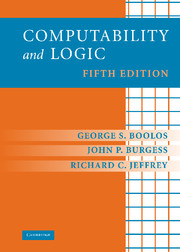Book contents
- Frontmatter
- Contents
- Preface to the Fifth Edition
- COMPUTABILITY THEORY
- 1 Enumerability
- 2 Diagonalization
- 3 Turing Computability
- 4 Uncomputability
- 5 Abacus Computability
- 6 Recursive Functions
- 7 Recursive Sets and Relations
- 8 Equivalent Definitions of Computability
- BASIC METALOGIC
- FURTHER TOPICS
- Annotated Bibliography
- Index
8 - Equivalent Definitions of Computability
Published online by Cambridge University Press: 05 June 2012
- Frontmatter
- Contents
- Preface to the Fifth Edition
- COMPUTABILITY THEORY
- 1 Enumerability
- 2 Diagonalization
- 3 Turing Computability
- 4 Uncomputability
- 5 Abacus Computability
- 6 Recursive Functions
- 7 Recursive Sets and Relations
- 8 Equivalent Definitions of Computability
- BASIC METALOGIC
- FURTHER TOPICS
- Annotated Bibliography
- Index
Summary
In the preceding several chapters we have introduced the intuitive notion of effective computability, and studied three rigorously defined technical notions of computability: Turing computability, abacus computability, and recursive computability, noting along the way that any function that is computable in any of these technical senses is computable in the intuitive sense. We have also proved that all recursive functions are abacus computable and that all abacus-computable functions are Turing computable. In this chapter we close the circle by showing that all Turing-computable functions are recursive, so that all three notions of computability are equivalent. It immediately follows that Turing's thesis, claiming that all effectively computable functions are Turing computable, is equivalent to Church's thesis, claiming that all effectively computable functions are recursive. The equivalence of these two theses, originally advanced independently of each other, does not amount to a rigorous proof of either, but is surely important evidence in favor of both. The proof of the recursiveness of Turing-computable functions occupies section 8.1. Some consequences of the proof of equivalence of the three notions of computability are pointed out in section 8.2, the most important being the existence of a universal Turing machine, a Turing machine capable of simulating the behavior of any other Turing machine desired. The optional section 8.3 rounds out the theory of computability by collecting basic facts about recursively enumerable sets, sets of natural numbers that can be enumerated by a recursive function. […]
- Type
- Chapter
- Information
- Computability and Logic , pp. 88 - 98Publisher: Cambridge University PressPrint publication year: 2007



